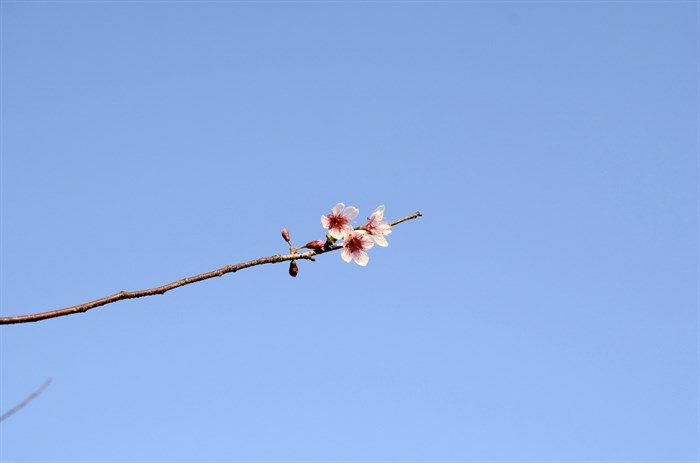As Okanagan cherry trees begin to bloom, cold snap damage becomes visible

Cherry growers are seeing the damage this winter’s cold snap has done to their trees as the buds begin to bloom, but one farmer said it’s still too early to tell exactly how bad the damage is.
Mike Dickinson from Dickinson Family Farm in Summerland helps run a small you-pick cherries orchard. Dickinson said he has about a quarter of the cherry blossoms he would normally see at this time of year.
“We have damage. These last couple mornings it’s been minus one here so that’s not helping anything. As of today I would guess we overall have around 25 per cent blossoms, maybe less,” he said. “They all say everything is dead, ours aren’t all dead, it may be a little early to really tell. The blossoms could get weak and they could fall off, and the cold mornings don’t help much.”
Seradaye Lean is an agrologist who works with fruit growers in the Okanagan.
"It’s extraordinarily variable from site to site, from farm to farm, variety to variety. It has been a real challenge to broad stroke an area. What I have been hearing is some growers said, and I have seen myself, that we have 50 to 70 per cent crop. I talked to growers who have said they have a 30 per cent crop, and some growers have said they have nothing to maybe a 10 per cent crop. It’s all over the place," she said.
There are a number of factors that contribute to the varied crop damage throughout the valley, including proximity to Okanagan Lake where the lake affects temperature, according to Lean.
The BC Ministry of Agriculture announced in a press release on March 13 it has set aside $70 million for farmers with struggling crops.
“Our government is here for B.C. producers who are facing challenges from severe vine and orchard damage from extreme weather, as well as those impacted by pests, plant disease and changing consumer and market demand,” Minister of Agriculture Pam Alexis said.
READ MORE: Kaleden viticulturist may have solution to keep vines warm during cold snaps
Dickinson said the government funds won’t help many farmers in the short term.
“I don’t think it will help us at all, but we don’t fall in the same category as everybody else,” he said. “I think (government support) is kind of always lacking. The thing is they say one thing and it’s like when are you going to get your money, two years from now, three years from now.”
Larger farms are going to have different obstacles than Dickinson’s two-acre crop.
“For big commercial farmers they need a lot of fruit or it’s not worth it for them to go and pick. They have a different problem than I have," he said.
"I’ve heard of guys wanting to kill the whole crop so they don’t have to spray. They figure it’s cheaper. Instead of having a small crop of cherries here and there, just burn them all off. I've heard that, but I don’t know who’s doing it, sprays are extremely expensive.”
Lean said each grower is going to take a different approach depending on how bad their damage is.
"I don’t want to diminish the experiences of any growers, but they are all a bit different. Some growers are going to be alright, and some growers are going to have a harder time," she said.
Dickinson said buying local is the best way to help farmers during a tough season and Lean echoed that sentiment, "buy local, shop BC."
To contact a reporter for this story, email Jesse Tomas or call 250-488-3065 or email the editor. You can also submit photos, videos or news tips to the newsroom and be entered to win a monthly prize draw.
We welcome your comments and opinions on our stories but play nice. We won't censor or delete comments unless they contain off-topic statements or links, unnecessary vulgarity, false facts, spam or obviously fake profiles. If you have any concerns about what you see in comments, email the editor in the link above. SUBSCRIBE to our awesome newsletter here.


